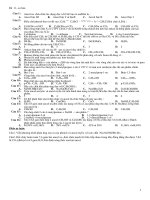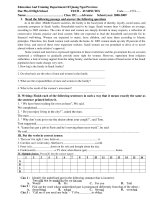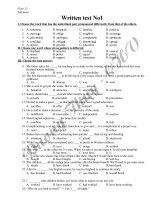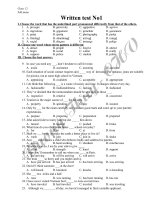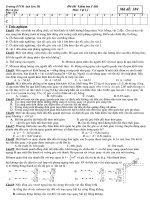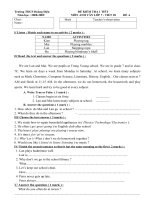ktra 15p-bài 15-lieu-bk
Bạn đang xem bản rút gọn của tài liệu. Xem và tải ngay bản đầy đủ của tài liệu tại đây (146.54 KB, 22 trang )
Full name:………………………………. TEST 15 MINUTES (NO1)
Class: 10 A ……
I. Choose the word which is incorrect.
1. It was not until I was 20 that I know how to drive.
A B C D
2. There is a book on the table. A book is very interesting.
A B C D
3. It was not until 1998 when she got married.
A B C D
4. When were you born ? – In Ha Noi.
A B C D
5. Mary is more pretty than her sister.
A B C D
6. He is famous about his powerful kicking and controlling the ball.
A B C D
7. He is the intelligentest student I have ever met.
A B C D
Full name:………………………………. TEST 15 MINUTES (NO2)
Class: 10 A ……
I. Choose the word which is incorrect.
1. It was not until I was 20 that I know how to drive.
A B C D
2. There is a book on the table. A book is very interesting.
A B C D
3. It was not until 1998 when she got married.
A B C D
4. When were you born ? – In Ha Noi.
A B C D
5. Mary is more pretty than her sister.
A B C D
6. He is famous about his powerful kicking and controlling the ball.
A B C D
7. He is the intelligentest student I have ever met.
A B C
II. Rewrite the following sentences.
1. She din’t do this job until she was 20 years old.
It was not until ………………………………………………………………
2. John didn’t have breakfast until he finished work.
It was not until ………………………………………………………………
3. John didn’t finish reading my book until last Saturday.
It was not until ………………………………………………………………
II. Rewrite the following sentences.
1. He didn’t arrive at the office until half past nine.
It was not until ………………………………………………………………
2. I didn’t sleep until midnight.
It was not until……………………………………………………………
3. We didn’t have any holidays until last summer.
It was not until………………………………………………………………
4.
5. I couldn’t finish my project until Mark helped me.
It was not until………………………………………………………
6. I didn’t know how to ride a bicycle until I was 15.
It was not until ……………………………………………………….
I)make question for the underlined parts of the following
statements:
( Phần đặt câu hỏi cho những từ gạch chân )
1 our teacher lives in a small house in this town.
2 The farmers are working in the field now
3 She went to market
to buy some bread.
4 There are 5 members in my family.
5 It often takes him 15 minutes to go to his office.
6 Peter runs with his dog on sunday.
7 Kim and Tina are playing ball in the garden.
8 The barnes are planning a trip to Norway.
9 He can't meet Sharon Because she is very ill.
10 She walks home from school.
11 David likes cats Because they are nice.
12 They listen to music to relax.
13 You should buy this camera, not that one.
14 I study English to have good in the future.
15 I often go to the English club once a week.
III) Give the correct form of verb (-ED or -ING) to complete the
sentences:
CÔNG THỨC:
* Present participle (hiện tại phân từ)
V + Ing
* Past participle: ( quá khứ phân từ )
V + ed/ V3
- Hiện tại phân từ và quá khứ phân từ đc sử dụng như là những tính từ
* QUÁ KHỨ phân từ mang tính chất bị động, đc dùng để nói lên thái độ,
cảm giác của con người
* HIỆN TẠI phân từ mang tính chất chủ động dùng để nói lên vật chất của
con người hoặc sự vật tạo ra.
BÀI TẬP:
1 It's sometimes when you have to ask people for
money. (embarrass)
2 We were all when we heard about the disaster.
(horrify)
3 Are you in football? (interest)
4 I enjoyed the football match. It was quite (excite)
5 They were with the film. (disappoint)
6 It's been raining all day. The weather is (depress)
II)Complete the conversations. Put in WILL or BE GOING TO with
the verbs.
Dùng will hay be going to
Cách làm: *sử dụng be going to ở trường hợp sau:
( Tương lai gần ) the near future
-Dùng để diễn tả 1 hành động xắp xảy ra trong tương lai gần theo 1 dự
định, 1 kế hoạch hay 1 trương trình đã xắp sẵn
CÔNG THỨC: S + Is/are/am + going to + Vinf
Ex: I'm going to buy a new house Because I save enough money
* Sử dụng Will ở trường hợp sau:
- Dùng để diễn tả 1 hành động xảy ra trong tương lai
1 ý định xảy ra bất chợt trong lúc nói.
CÔNG THỨC: S + will/ shall + Vinf
Ex: I will buy a new car.
BÀI TẬP:
1 Do you want to go shopping with me? I (go) to the
supermarket.
2 A: what do you want to be when you grow up?
B: I (be) a teacher.
3 A: Who wants to clean the board?
B: I (do) it.
3 A: It's very cold.
B: I (close) the window.
5 A: We haven't got any sugar.
B: Oh, haven't we. I (get) some from the shop then
I. Supply the correct verb forms: The simple present tense or The
present continuos tense:
1. Be quiet! The baby (sleep).
2. We seldom (eat) before 6:30.
3. Look! A man (run) after the train. He (want) to catch it.
4. The Sun (set) in the West.
5. It (be) often hot in summer.
6. I (do) an exercise on the present tenses at this moment and I
(think) that I (know) how to use it now.
7. My mother sometimes (buy) vegetables at this market.
8. It (be) very cold now.
9. It (rain) much in summer. It (rain) now.
10. Daisy (cook) some food in the kitchen at present. She always
(cook) in the morning.
II. Supply the correct verb form: The present perfect or The
present perfect continuos:
1. How long you (study) English? For 5 years.
2. I (wait) for two hours, but she (not come) yet.
3. They (live) in Ho Chi Minh City since 1975.
4. She (read) all the books written by Charles Dickens. How many
books you (read)?
5. He (not, be) here since Christmas, I wonder where he (live)
since then.
6. Jack (go) to Paris for a holiday. He never (be) there.
7. You (sleep) so far? I (ring) the bell for the last twenty minutes.
8. He (write) a novel for two years, but he (not finish) it yet.
9. Mary (lose) her hat and she (look) for it until now.
10. I (see) that film several times because I like it.
III. Supply the correct verb form: Present tenses.
1. Listen! I (think) someone (knock) at the door.
2. Up to the present, we (write) almost every lesson in the book.
3. The Earth (circle) the Sun once every 365 days.
4. The farmers (work) in the field at the moment.
5. How many times you (see) him since he went to Edinburgh?
6. Rivers usually (flow) to the sea.
7. Look! The boy (cry).
8. Do you know that man, who (smoke) there?
9. Mrs Green always (go) to work by bus.
10. We (be) from French. We (be) there for twenty years.
11. That house (belong) to Mr. Green.
12. Mai (lose) her dictionary.
13. I (be) sorry. I (forget) that girl's name already.
14. I (wait) for the manager for two hours.
15. You (ever, see) a lion?
IV. Supply the correct verb form: Simple past or Present perfect.
1. I (see) her before.
2. I (see) her last year.
3. Tom never (be) in Hanoi.
4. I (read) the novel written by Jack London several times before.
5. What you (do) yesterday?
6. You (watch) TV last night?
7. She (be) born in 1980.
8. He (write) a book since last year.
9. Mr Green. (teach) English in this school since he (graduate)
from the university in 1986.
10. How long you (learn) English?
V. Supply the correct verb form: Simple past or Past continuos.
1. When I (arrive) at this house, he still (sleep).
2. The light (go) out while we (have) dinner.
3. Bill (have) breakfast when I (stop) at this house this morning.
4. As we (cross) the street, we (see) an accident.
5. Tom (see) a serious accident while he (stand) at the bus stop.
6. While my father (read) a newspaper, I (learn) my lesson and
my sister (do) her homework.
7. The children (play) football when their mother (come) back
home.
8. The bell (ring) while Tom (take) a bath.
9. I (be) very tired because I (work) all day yesterday.
10. He (sit) in a cafe when I (see) him.
VI. Give the right forms of the verbs in brackets: Simple past or
Past perfect.
1. They (go) home after they (finish) their work.
2. She said that she (already, see) Dr. Rice.
3. When we came to the stadium, the match (already, begin).
4. They told me they (not, eat) such kind of food before.
5. He (ask) why we (come) so early.
6. After they had gone, I (sit) down and (rest).
7. Before she (watch) TV, she (do) her homework.
8. After taking a bath, he (go) to bed.
9. What (be) he when he (be) young?
10. It was the first time I (ever, see) such a beautiful girl.
VII. Give the right forms of the verbs in brackets: Past tenses.
1. Yesterday John (go) to the store before he (go) home.
2. Our teacher (tell) us yesterday that he (visit) England in 1970.
3. When John and I got to the theatre, the movie (start) already.
4. Before Alice (go) to sleep, she (call) her family.
5. When the phone (ring), I (have) dinner.
6. Daisy (agree) with other members in the last meeting.
7. What you (do) at 6 p.m yesterday?
8. The little girl asked what (happen) to her ice-cream.
9. He (teach) in this school before he (leave) for England.
10. She (win) the gold medal in 1986.
VIII. Give the right forms of the verbs in brackets: Simple future
or Simple present.
1. We'll go out when the rain (stop).
2. I (stay) here until he (answer) me.
3. Wait until I (catch) you.
4. She (not come) until you (be) ready.
5. Miss Helen (help) you as soon as she (finish) that letter
tomorrow.
6. After the class (be) over, ask the teacher about that sentence.
7. I (come) and (see) you before I leave here.
8. We (go) home as soon as we have finished our work.
9. I (wait) here until you (come) back tomorrow.
10. I (send) you some postcards as soon as I (arrive) in London.
IX. Give the right forms of the verbs in brackets: Simple future or
Simple present, Present perfect or Future perfect.
1. I'll wait until he (finish) his novel.
2. When you (came) back, he already (buy) a new house.
3. Don't come until I (finish) lunch.
4. I (hope) it (stop) raining by 5 o'clock this afternoon.
5. The river (not begin) to swell until some rain (fall).
6. By next month I (leave) for India.
7. The film (end) by the time we (get) there.
8. They (build) a house by June next year.
9. We (start) our plan next week.
10. I (give) her your letter when I (see) her tomorrow.
X. Give the right forms of the verbs in brackets: Simple future or
Simple present or Future continuos.
1. When you (go) into the office, Mr John (sit) at the front desk.
2. Our English teacher (explain) that lesson to us tomorrow.
3. We (wait) for you when you (get) back tomorrow.
4. What you (do) at 7 p.m next Sunday? I (practice) my English
lesson then.
5. When I (see) Mr. Pike tomorrow, I (remind) him of that.
6. When you (come) today, I (work) at my desk in Romm 12.
7. He (work) on the report at this time tomorrow.
8. Please wait here until the manager (return).
9. Don't leave until you (see) her.
10. The brown (do) their housework when you (come) next
Sunday.
XI. Supply the correct verb forms.
1. I (see) a car accident while I (wait) for you on this corner
yesterday.
2. Mr. john (be) principal of our school since last year.
3. Mr. Smith (teach) at this school since he (graduate) in 1980.
4. My father (not watch) TV every night.
5. I (meet) Authur three weeks ago.
6. Yesterday the police (report) that they (capture) the thief.
7. My friend (thank) me for what I had done for him.
8. Someone (steal) my handbag on the bus.
9. The Browns (live) in Paris for 7 years when the second World
War (break) down.
10. Last month I (be) in the hospital for ten days.
11. Don't call me in the afternoon. I usually (be) away in the
afternoon.
12. Mr. Clark (be) in New York 2 months ago. Mr. Rossi (be) in
New York until 2 months ago.
13. John (drive) that car ever since I (know) him.
14. People (speak) English in most of Canada.
15. The dog (wag) his tail whenever he (see) me.
16. What you (do) when I (ring) you last night?
17. Up to then I never (see) such a fat man.
18. I (not see) him last Monday.
19. They had sold all the books when we (get) there.
20. I think he (leave) as soon as he (know) the news.
21. She (play) the piano when our guests (arrive) last night.
22. He (come) and (see) you soon.
23. I (come) as soon as I have finished my work. You (be) ready?
24. My mother (come) to stay with us next weekend.
25. Where you (spend) your holidays next summer?
26. Violets (bloom) in spring.
27. We (not live) in England for two years now.
28. I (never forget) what you (just tell) me.
29. They (prepare) the Christmas dinner at the moment.
30. When I last (stay) in Cairo, I (ride) to the Pyramids on a
camel that my friend (borrow) the day before.
31. Our teacher (tell) us yesterday that he (visit) England in 1970.
32. George (work) at a university so far.
33. When he lived in Manchester, he (work) in a bank.
34. Birds (build) their nests in summer and (fly) to the South in
winter.
35. I (lose) my key. (Can) you help me look for it?
36. My father (not smoke) for 5 years.
37. My teacher wasn't at home when I (arrive). He (just go) out.
38. How long Bob and Mary (be) married?
39. You (receive) any letter from your parents yet?
40. My brother (join) the army when he (be) young.
41. You (remember) my name or you (forget) it someday?
42. Tom (study) chemistry for three years and then he gave it up.
43. Miss Lee often (write) when she was on holiday.
44. He (leave) home two weeks ago and we (not hear) from him
since then.
45. You (speak) to Mrs. Baker yesterday?
No, I (not see) her for a long time. I (not can) remember when I
last (see) her.
46. When the teacher came in, the pupils (play) game.
47. Columbus (discover) America more than 400 years ago.
48. By next month, I (finish) my first novel.
49. By May 5, we (live) in this city for ten years.
50. When your father (die)? I (not kow) when he (die).
51. Bill said he (forget) to buy a dictionary.
52. He felt asleep while he (do) his homework.
53. We (not see) them for a long time.
54. It (rain) when we arrived.
55. Kite and I (wait) right here until you get back.
56. He'll leave as soon as he (hear) the news.
57. Dick (start) school before he seven.
58. How long you (study) in this school?
59. We (not receive) any letter from him since he (leave) four
months ago.
60. Where are you? I'm upstairs. I (have) a bath.
61. I (speak) to you about that matter after the meeting tonight.
62. At this time next week, we (live) in USA.
63. Hurry up! The train (come).
64. Be quiet! The teacher (be) angry.
65. Why didn't you listen while I (speak) to you?
66. Some animals (not eat) during winter.
67. I (finish) the book before my next birthday.
68. John (watch) TV at 8 last evening.
69. Mr. Pike (live) here since last October.
70. Someone (cut) down all the trees in the garden.
71. The house (build) two years ago.
72. Listen! The bird (sing).
73. Trees (plant) since it (stop) raining.
74. Tom Baker (not come) here tomorrow.
75. By the end of last March, I (study) English for 5 years.
76. He often (say) O.K when he (talk) with the guests.
77. What you (do) after you (go) home yesterday?
78. How long you (wait) for me? Just a few minutes.
79. He (do) his homework before he went to the cinema.
80. By noon, I (wait) for her for two hours.
81. By the time you come there, she (make) a big cake.
82. Yesterday thieves (break) into the house and (steal) a lot of
fur coats while the guests (dance).
83. When I came in, they all (sit) round a fire. Mr. Pike (do) a
crossword puzzle, Mrs. Pike (knit), and the others (read).
84. Mr. Jackson (paint) his house since last month.
85. She (ask) me to tell about him several times.
86. The audience (listen) to everything he said last night.
87. At 4 p.m yesterday? Well, I (work) in my office at that time.
88. A: I (play) football when I was 5 years
old.
B: You (play) since you (come) to
England?
.
A: Oh, yes. I (play) quite a lot. I (join) a club the day after I
(arrive).
89. I'm preparing to support anything he (say) tomorrow.
90. Sometimes I (get) up before the Sun (rise).
91. He said he (be) mistaken.
92. Don't speak until someone (ask) you.
93. Mary (come) from London.
94. Please be quiet! I (work).
95. When I (be) a child, I (want) to be a doctor.
96. David (be) born after his father (die).
97. Long ago, my younger brother often (cry).
98. I (not send) the parcel until I hear from you.
99. The last train (leave) the station at 5 p.m.
100. Up to now, the teacher (give) our class five tests
Câu hỏi WH là
câu hỏi bắt đầu bằng từ có W và H. Những từ này gồm có: WHAT,
WHO, WHERE, WHEN, WHY và HOW. Trong bài này ta tạm gọi
chúng là từ WH.
Học xong động từ TO BE rồi, giờ ta có thể áp dụng TO BE với
những từ WH để đặt ra vô số câu hỏi.
* Nghĩa của các từ WH:
WHAT = cái gì
WHO = ai
WHERE = ởđâu
WHEN = khi nào
WHY = tại sao
HOW = như thế nào, bằng cách nào
* Công thức câu hỏi WH với động từ TO BE:
Từ WH + TO BE + Chủ ngữ + Bổ ngữ ?
-Lưu ý:
+ TO BE phải được chia đúng biến thể (AM hay IS hay ARE) tùy
theo chủ ngữ.
+ Bổ ngữ có thể là danh từ, tính từ, trạng từ, trạng ngữ chỉ nơi
chốn, trạng ngữ chỉ thời gian. Có thể không có bổ ngữ.
- Ví dụ:
+ WHAT IS LOVE? = tình yêu là gì?
+ WHO AM I? = Tôi là ai?
+ WHO ARE YOU? = Bạn là ai?
+ WHERE IS MY KEY? = Chìa khóa của tôi ở đâu?
+ WHY AM I HERE? = Tại sao tôi lại ở đây?
+ HOW ARE YOU? = Bạn như thế nào? (Tức là "Bạn khỏe không?")
+ HOW IS IT MADE? = Nó được làm ra bằng cách nào?
* Trường hợp đặc biệt HOW:
- Với từ HOW, ta còn có công thức sau:
HOW + Tính từ + TO BE + Chủ ngữ + Bổ ngữ (nếu có) ?
- VD:
+ HOW TALL ARE YOU? = Bạn cao bao nhiêu?
+ HOW MUCH IS IT? Nó bao nhiêu vậy? (Hỏi giá tiền)
+ HOW FAR IS IT FROM YOUR HOUSE TO SCHOOL? Từ nhà bạn
đến trường bao xa?

